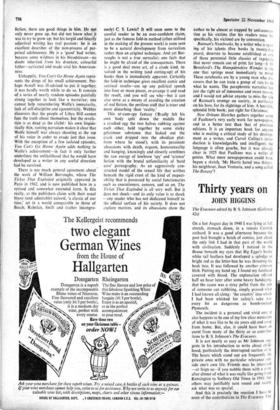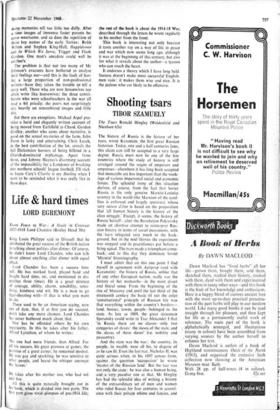Thirty years on
JOHN HIGGINS
On a hot August day in 1940 I was lying at full stretch, stomach down, in a remote Cornish orchard. It was a good afternoon because the post had brought a batch of comics, just about the only link I had in that part of the world with civilisation. Suddenly I noticed in the Beano beneath my eyes that Big Eggo's bushy white tail feathers had developed a splodge as bright red as the letter-box he was thrusting his beak into. It was followed by another crimson blob. Putting my hand up, I found my forehead covered with blood. The explanation offered half an hour later after some heavy bandaging, that the cause was a stray pellet from the gun of someone out rabbiting, simply proved what I had known all along: 'the country' into which I had been whisked for safety's sake was every bit as dangerous as bomb-rocked Plymouth. The incident is a personal and vivid one; it also happens to be one of my few clear memories of what it was like to be six years old and away from home. But, alas, it could have been an event from many of the thirty or so contribu- tions to B. S. Johnson's The Evacuees.
It is not nearly as easy as Mr Johnson sug- gests in his introduction to write about child- hood, particularly the interrupted section of it. The hours which stand out are frequently the private ones with no particular relevance out- side one's own life. Friends may be interested —or feign so—if you nobble them with a story after dinner of what it was really like going from Kensington to Sodbury Old Town in 1941: but others may justifiably turn round and rudely ask what was so special. And this is precisely the reaction I have to most of the contributions to The Evacuees. Too
many memories tell. too little too dully. After 3 lime images of immense foster parents be- Dome wearisome, and so does the repetition of tbose key names of the early 'forties: Robb Wilton and Stephen King-Hall, Happidrome and In Which We Serve, Trigger and Flash Gordon. One man's anecdote could well be another's.
The problem is that not too many of Mr Johnson's evacuees have bothered to analyse their feelings nor—and this is the fault of hav- ing a large proportion of non-professional writers—have they taken the trouble to tell a story well. Those who are now housewives too often write like housewives; the three contri- butors who were schoolteachers in the war all read a bit prissily; the poets not surprisingly rely heavily on remembered images and- little else.
But there are exceptions. Michael Aspel pro- vides a lucid and elegantly written account of being moved from Earlsfield to Chard. Gordon Gridley, another who cares about narrative, is good on the sexual mysteries of the farm. John Furse is larky and entertaining. Chris Leach, in the best contribution of the lot, reveals the full Dickensian horrors of being billeted in a Church-dominated orphanage. Apart from those, and Johnny Haynes's disarming account of the impossibility for a Londoner of breaking into northern schools' league football, I'll stick to Joyce Cary's Charlie is my Darling when I want to be reminded what it was really like in those days.



































 Previous page
Previous page